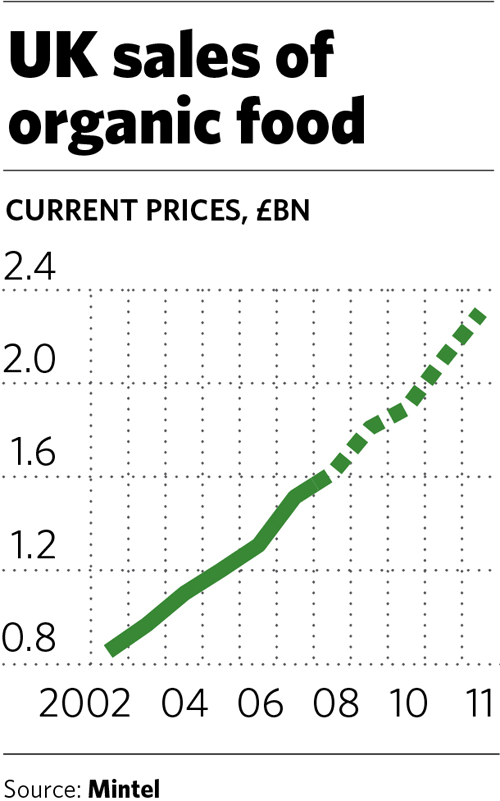Organic industry unable to cope with demand

British shoppers have embarked on a love affair with organic food, sending sales soaring year after year, but now its runaway success is being threatened: by its very popularity.
The sector, which has seen explosive growth of 70 per cent since 2002, is now facing shortages, according to a report published today. The market research company Mintel says the reluctance of farmers to convert their land to organic, and demand for biofuels, is limiting supply, particularly of grain to feed livestock.
Shoppers are reluctant to accept imported organic food, with imports falling from 70 per cent to 30 per cent, further increasing pressure on UK farmers. "No one can deny the benefits of supporting British producers but this dramatic shift towards British organic food has created serious supply problems – there is simply not enough British-grown organic food," Mintel said.
"The conversion process from regular to organic farming takes several years to complete," said David Bird, the report's author. "Because of this, many producers have not been able to react quickly to satisfy growing demand for home-grown organic food, and this has undoubtedly had a huge impact on the market."
According to the report, the UK market for organic food will grow from £1.5bn in 2007 to £2.2bn in 2012. Fruit and vegetables are expected to remain the most popular category, worth around £500m in 2007 – a third of the total sales.
Health was the most important reason people bought organic, a trend expected to be reinforced by a study from Newcastle University showing organic food to be higher in antioxidants and minerals. A third of people said it was worth buying organic food, compared with 24 per cent in 2003. Greater health concerns, media coverage of health scares and interest in the production and provenance of food were all driving sales.
"Further value rises have been impeded by undersupply in some segments. A serious shortfall in grain has, for example, affected supply to the meat, cereal and egg markets, while insufficient organic arable land has affected fruit and vegetable production," the report said.
Many farmers, the report added, were reluctant to convert their land because they were concerned that the popularity of organic food would be short-lived.
As new producers slowly entered the market and more land became available, Mintel predicted the market would surge in value.
While fruit, vegetables and dairy have been the most successful organic products to date, organic meat is expected to grow 71 per cent within five years – the fastest of any sector.
"Consumers are set to think more about the meat they buy following Jamie Oliver and Hugh Fearnley- Whittingstall's controversial and highly emotive TV programmes highlighting intensive poultry farming," said Mr Bird.
The Soil Association, Britain's leading certification body, said there were many reasons why people bought organic. It described Mintel's £1.5bn figure as "conservative" and pointed out its latest organic market report had sales nudging £2bn in 2006. It said it was working with farmers to encourage supply.
Subscribe to Independent Premium to bookmark this article
Want to bookmark your favourite articles and stories to read or reference later? Start your Independent Premium subscription today.

Join our commenting forum
Join thought-provoking conversations, follow other Independent readers and see their replies